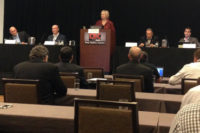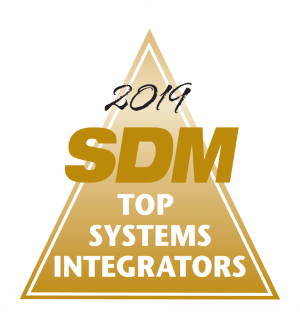Right off the bat, TEC 2018, the annual conference presented by PSA which was held for the first time this year in downtown Denver, March 12-16, set the tone for the event with a galvanizing keynote speech by motivational speaker Glenn Bill. Bill had attendees stand and shout, “I’m alive! I’m alert! And I feel great!”
With a list of 10 ways to create a positive attitude — be nice; set big goals; believe in you; do more than you are paid for; have a mentor and copy them; control your emotions; grow or die; love adversity; eat right and exercise; and be a part of something bigger than you — Bill hit on some of the biggest themes in the upcoming sessions and educational seminars.
For example, in his session on “5 Technological Forces Transforming Physical Security,” Steve Van Till, president and CEO of Brivo, addressed the “grow or die” concept, stating that cloud and mobile are not only transformative, but the building blocks for other changes. “Mobile credentials are changing the relationships with customer’s users or tenants. They are like a benign Trojan Horse. You put a security app on someone’s phone and now you have the possibility of a relationship with people coming and going from a building that we never had as an industry before.”
Some of the themes that came up again and again included artificial intelligence —which Van Till argued can’t happen without cloud — cyber security, managed services and the changing customer.
One of the highlights of the TEC event every year is the “State of the Industry Panel.” This year it was held over lunch in conjunction with the Vendor Awards (see below for a list of the winners.). Panelists included Don Erickson, president and CEO of the Security Industry Association; Matt Barnette, president of Mercury Security; Tim Palmquist, vice president of Americas, Milestone; and Dave Labuskes, CEO of AVIXA, a pro-AV company. The discussion started right off with the big kahuna: cyber security.
Erickson noted that the cyber conversation in the industry has really shifted recently. “Up until this year the conversation had been about threats,” he said. “Obviously those still matter, but now it is shifting to talking about opportunities for integrators to be advisers on good cyber hygiene.”
Another upcoming trend on everyone’s minds was artificial intelligence. “AI is the most interesting topic of the day,” Palmquist said. “I think when we look back through the lens of history we will agree that machine learning [was] a change agent…. Our best days are in front of us when you talk about AI and the security marketplace.”
One somewhat surprising question moderator Bill Bozeman (PSA president and CEO) asked the panel involved DIY, an issue usually reserved for residential dealers, not commercial integrators. But, as Bozeman pointed out, it is something that could grow to affect the integration side of the business as well.
“A lot of studies say integrators aren’t looking at the DIY market,” Erickson answered, “but I think one of the things that is great about integrators is that the customer comes first and DIY can give customers more choices.”
Barnette admitted it isn’t much on the radar for integrators yet, but noted that his company has had end users wanting to buy direct for a number of years. “It will creep into light commercial and go up from there. We are focused on making systems easier to install while maintaining the integrator value.”
That issue — the relationship between integrators and manufactures — can be a somewhat thorny topic and was one that PSA decided to address in a session called “Why Can’t We Be Friends? Healing the Rift Between Integrators and Manufacturers in the Security Industry.” Chad Umbarger, national account manager for Hanwha Techwin America, suggested the key to a good relationship is communication, and other panelists agreed. “From our perspective, the part we value most is honesty and trust,” said Jason Stoft, Western U.S. sales manager for ScanSource Networking and Security. “If you say you are going to do something at the manufacturer level, then following through is important.”
But the integrator, too, has a role to play, said Gannon Switzer, executive vice president, KST Security. “If you are looking for loyalty in that the manufacturer is only going to work with you in your market, then you have to be willing to say, ‘You are the only product I’m going to sell.’”
One of the most frank and interesting sessions, moderated by Sandy Jones of SJandCo, immediately followed the State of the Market luncheon and continued some of the same themes — this time with PSA Leadership weighing in on the future state of the industry. It featured PSA board members Bill Bozeman, Paul Thomas, president and COO, Northland Controls; Christine Lanning, president, Integrated Security Technologies; and J. Matthew Ladd, president and COO, The Protection Bureau.
Bozeman didn’t pull any punches in starting off with how few members are taking advantage of the new opportunities PSA has been trying to pull them into. “What you haven’t heard is how little most of us are doing [with cyber security],” he said. “It’s kind of scary. We are doing our best, but I think the majority of our integrators are ill prepared, currently. I know why. It is a giant pain and they can’t figure out how to make money doing it.”
Bozeman compared it to the fence-sitting that occurred several years ago when the analog to digital transition was just starting. “I worry about our integrators. We have the tools for you and few of you have chosen to use them. It has been a real struggle for us. We are trying and we know it is the right thing to do and you have to do it if you want to stay in business. We are going to keep plugging but you are going to have to do it whether you want to or not.”
In the spirit of the keynote’s “loving adversity” suggestion, Jones asked the panel to list their three potential “business killers.”
Ladd reiterated the DIY issue as one. “I think it is a real serious threat to our business. It is already there in the residential market because of millennials and generation Zs. I think we will see that more in the commercial market.”
Millennials figured prominently in several panelists’ comments. Lanning took a more positive spin on embracing the change, speculating that millennial and later generations’ buying patterns will force integrators to start relying more on technology and automation. “It comes down to customer experience. I had my car detailed recently. I made my appointment online. I got text messages reminding me of the appointment. I paid online. I didn’t even have to talk to anybody. To me that was a great customer experience and I would challenge us on that. How easy is it to do business with us? Is it too complicated to deal with? Customers aren’t going to stand for that…. And if you can’t adapt to that, all I can say is Uber.”
Thomas shared an anecdote about the city council of Charlotte, N.C. which is now comprised of entirely millennials, who in term don’t want to be called ‘millennials’ anymore. “They prefer to be called ‘agents of destruction,’ he said. “For us in the San Francisco Bay area there is a high concentration of this age group. We see them as our next leaders and we need to figure out how do these people engage?”
Jones then asked about the top drivers for new business. Bozeman again pointed out how many are potentially missing some immediate opportunities that are out there right now.
“Some of our integrators won’t like this, but managed services is a big one. You all know it is good for your cash flow and we have been preaching it for years, but 90 percent have chosen not to participate. At the very least you need to understand the business model your competitor will use against you, then be able to explain to customers why you think it is a bad idea.”
He also mentioned autonomous vehicles as an up and coming driver. “It’s another one that nobody wants to do, but autonomous security is not going to go away. None of you are making money selling robots and drones yet, but it is going to happen. It might not be a bad idea to get plugged in. It will open up new markets.”
Jones concluded the panel by asking each member for one takeaway integrators should get from the discussion, but it could just as easily apply to the TEC conference overall. Their answers were interesting.
Ladd: “Change.”
Lanning: “Work harder.”
Thomas: “What got you here today will not get you there tomorrow.”
Bozeman: “Have Fun!”
PSA Vendor Award Winners
At TEC 2018, held March 12-16 in Denver, vendor awards were given out at a luncheon held Tuesday, March 13. This year marked the first time the recently acquired USAV was represented at TEC so the awards were combined. The winners were:
Customer Service – Individual Excellence
- Alison Smith, Windy City Wire
- Amandeep Saini, exacq
- Arthur Johnson, Security Lock Distributors
- Jason Schlichting, ScanSource
- Jim Branagan, Security Lock Distributors
- John Rogers, Lenel
Customer Service – Team Excellence
- Bosch
Star Vendor Awards
- Almo
- AMAG
- Bosch
- Exacq
- Hanwha Techwin America
- HID
- Lenel
- Liberty AV Solutions
- LifeSafety Power
- Milestone
- Milestone (Pro-AV, not related to the security company)
- Shure
- Surgex
- Windy City Wire
Superstar Vendor Achievement Awards
- Altronix
- Harman





